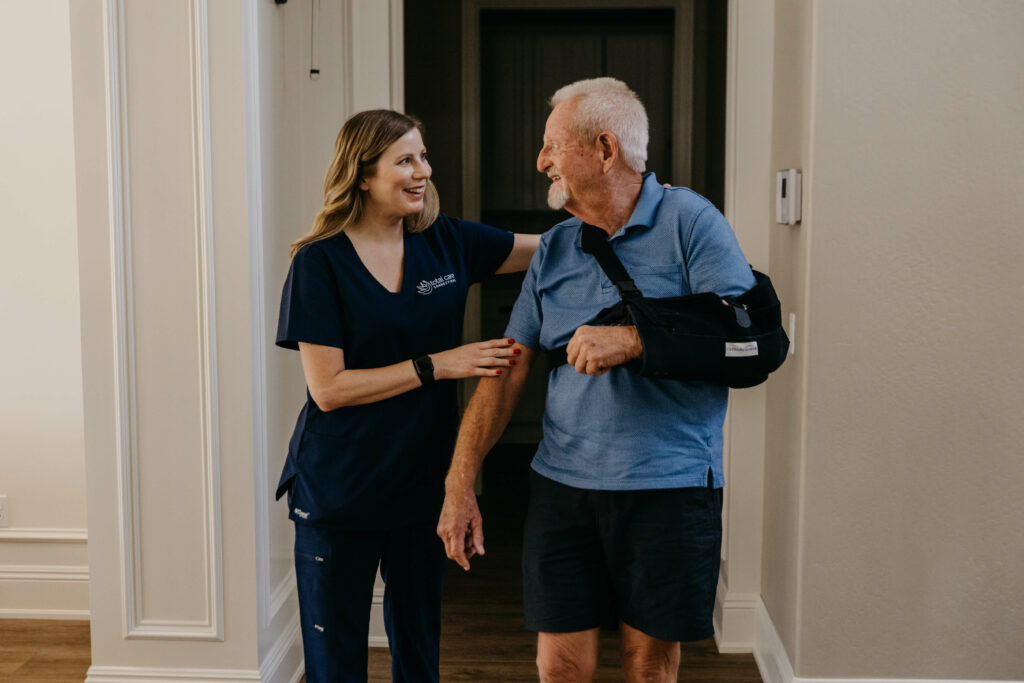January and February can be especially dangerous months for older adults as influenza cases tend to rise in the months following the holidays. Now with COVID-19 added to the mix, it is important to know the extra tips and tricks for boosting your immune system so that it can do its job even better. Without a proper immune system response, you and your loved one can find that you get sick more often and typically for longer periods of time, which can be especially dangerous for older adults living with complex or chronic conditions.
While we can’t prevent picking up germs completely during these next few months, there are a few habits and changes you can make to increase that important immune system response. Try incorporating a few yourself as well as encouraging your older loved one to do the same.
Practice Good Hand Hygiene
First things first, all good immune systems begin with prevention. Your best tool for not getting sick is to practice good hand hygiene consistently. Older adults can sometimes struggle with this for mobility or endurance reasons (it can be hard to stand up to wash their hands at the sink unsupported for long periods of time). However, it is crucial to incorporate frequent hand washing into their daily routine.
Remember the basics: warm water is best, scrub for 20 seconds before rinsing soap, and do it before and after eating, after using the restroom, and after returning home from being outside.
Drink Plenty of Water
Hydration is a key component in your body’s immune response, so make sure you and your loved one are drinking plenty of water throughout the day. While you don’t have to skip your regular coffee or tea in the morning, try to drink water before and after your cup. Decrease alcohol consumption too in order to keep your immune system operating at its best level.
Make Sleep a Priority
Any type of stressor can hit your immune system hard, including lack of sleep. Make sure you are getting enough sleep and are consistent with a bedtime routine. If you find you or your loved one are struggling to get enough sleep, talk to your physician about it. Aim for a solid 8 hours of sleep and listen to your body when it is telling you it needs more.
Eat the Rainbow
We’ve all heard the phrase “you are what you eat”, so be sure you are eating a diet that will enhance your immune system response. Eating foods with bright colors is a great place to start, focusing on bringing in more fruits and vegetables to your diet this time of year. Try to incorporate a few servings at each meal and keep fruits and vegetables prepared in the fridge for easy snacking too.

Get Moving
Regular exercise can do wonders for your body’s immune response. Incorporate regular movement into your daily routine as well as encourage your loved one to do the same. Try making time to get moving together by scheduling a regular morning walk together or by taking a yoga class in the evening together.
Try Meditation
Finally, when your body is consistently stressed out, it is not going to fare well when illness comes around. Chronic stress is, unfortunately, a part of our daily lives, but you can make some seriously positive changes by trying to add short meditations into your regular routine. Try using an app like Headspace to get started. Anyone can meditate and you don’t need to meditate for long periods of time to notice the difference in your stress levels.
If you are under stress because of your caregiving duties, or if you notice your loved one is not able to maintain good hand hygiene, sleep, or nutrition, we are here to help. Our caregivers and other experts are ready to step in to provide personalized support and assistance to make life a bit easier and more enjoyable for everyone involved.
Contact us to learn more about our services or to schedule a free consultation. Here’s to a healthy new year!
